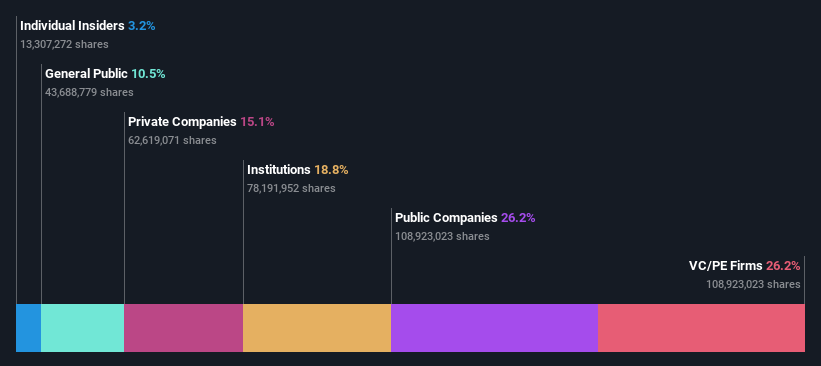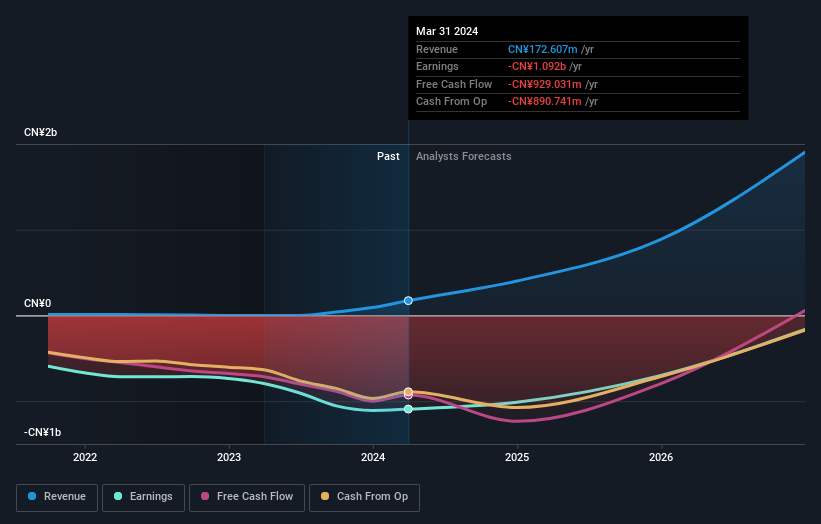Stock Analysis
Dizal (Jiangsu) Pharmaceutical Co., Ltd.'s (SHSE:688192) market cap dropped CN¥1.6b last week; Public companies bore the brunt

Key Insights
- Significant control over Dizal (Jiangsu) Pharmaceutical by public companies implies that the general public has more power to influence management and governance-related decisions
- A total of 2 investors have a majority stake in the company with 52% ownership
- Institutional ownership in Dizal (Jiangsu) Pharmaceutical is 19%
To get a sense of who is truly in control of Dizal (Jiangsu) Pharmaceutical Co., Ltd. (SHSE:688192), it is important to understand the ownership structure of the business. We can see that public companies own the lion's share in the company with 26% ownership. Put another way, the group faces the maximum upside potential (or downside risk).
And following last week's 8.9% decline in share price, public companies suffered the most losses.
In the chart below, we zoom in on the different ownership groups of Dizal (Jiangsu) Pharmaceutical.
View our latest analysis for Dizal (Jiangsu) Pharmaceutical

What Does The Institutional Ownership Tell Us About Dizal (Jiangsu) Pharmaceutical?
Institutional investors commonly compare their own returns to the returns of a commonly followed index. So they generally do consider buying larger companies that are included in the relevant benchmark index.
As you can see, institutional investors have a fair amount of stake in Dizal (Jiangsu) Pharmaceutical. This can indicate that the company has a certain degree of credibility in the investment community. However, it is best to be wary of relying on the supposed validation that comes with institutional investors. They too, get it wrong sometimes. If multiple institutions change their view on a stock at the same time, you could see the share price drop fast. It's therefore worth looking at Dizal (Jiangsu) Pharmaceutical's earnings history below. Of course, the future is what really matters.

We note that hedge funds don't have a meaningful investment in Dizal (Jiangsu) Pharmaceutical. The company's largest shareholder is AstraZeneca PLC, with ownership of 26%. With 26% and 14% of the shares outstanding respectively, SDIC Innovation Investment Management Co., Ltd. and Jiangsu Wuxi Dizhe Enterprise Management Partnership Enterprise (Limited Partnership) are the second and third largest shareholders. Additionally, the company's CEO Zhang Xiaolin directly holds 1.8% of the total shares outstanding.
To make our study more interesting, we found that the top 2 shareholders have a majority ownership in the company, meaning that they are powerful enough to influence the decisions of the company.
While studying institutional ownership for a company can add value to your research, it is also a good practice to research analyst recommendations to get a deeper understand of a stock's expected performance. There are a reasonable number of analysts covering the stock, so it might be useful to find out their aggregate view on the future.
Insider Ownership Of Dizal (Jiangsu) Pharmaceutical
The definition of company insiders can be subjective and does vary between jurisdictions. Our data reflects individual insiders, capturing board members at the very least. The company management answer to the board and the latter should represent the interests of shareholders. Notably, sometimes top-level managers are on the board themselves.
Most consider insider ownership a positive because it can indicate the board is well aligned with other shareholders. However, on some occasions too much power is concentrated within this group.
We can see that insiders own shares in Dizal (Jiangsu) Pharmaceutical Co., Ltd.. It is a pretty big company, so it is generally a positive to see some potentially meaningful alignment. In this case, they own around CN¥513m worth of shares (at current prices). If you would like to explore the question of insider alignment, you can click here to see if insiders have been buying or selling.
General Public Ownership
The general public-- including retail investors -- own 11% stake in the company, and hence can't easily be ignored. While this size of ownership may not be enough to sway a policy decision in their favour, they can still make a collective impact on company policies.
Private Equity Ownership
Private equity firms hold a 26% stake in Dizal (Jiangsu) Pharmaceutical. This suggests they can be influential in key policy decisions. Sometimes we see private equity stick around for the long term, but generally speaking they have a shorter investment horizon and -- as the name suggests -- don't invest in public companies much. After some time they may look to sell and redeploy capital elsewhere.
Private Company Ownership
We can see that Private Companies own 15%, of the shares on issue. It might be worth looking deeper into this. If related parties, such as insiders, have an interest in one of these private companies, that should be disclosed in the annual report. Private companies may also have a strategic interest in the company.
Public Company Ownership
We can see that public companies hold 26% of the Dizal (Jiangsu) Pharmaceutical shares on issue. This may be a strategic interest and the two companies may have related business interests. It could be that they have de-merged. This holding is probably worth investigating further.
Next Steps:
While it is well worth considering the different groups that own a company, there are other factors that are even more important. Consider for instance, the ever-present spectre of investment risk. We've identified 2 warning signs with Dizal (Jiangsu) Pharmaceutical (at least 1 which is a bit unpleasant) , and understanding them should be part of your investment process.
But ultimately it is the future, not the past, that will determine how well the owners of this business will do. Therefore we think it advisable to take a look at this free report showing whether analysts are predicting a brighter future.
NB: Figures in this article are calculated using data from the last twelve months, which refer to the 12-month period ending on the last date of the month the financial statement is dated. This may not be consistent with full year annual report figures.
Valuation is complex, but we're helping make it simple.
Find out whether Dizal (Jiangsu) Pharmaceutical is potentially over or undervalued by checking out our comprehensive analysis, which includes fair value estimates, risks and warnings, dividends, insider transactions and financial health.
View the Free AnalysisHave feedback on this article? Concerned about the content? Get in touch with us directly. Alternatively, email editorial-team (at) simplywallst.com.
This article by Simply Wall St is general in nature. We provide commentary based on historical data and analyst forecasts only using an unbiased methodology and our articles are not intended to be financial advice. It does not constitute a recommendation to buy or sell any stock, and does not take account of your objectives, or your financial situation. We aim to bring you long-term focused analysis driven by fundamental data. Note that our analysis may not factor in the latest price-sensitive company announcements or qualitative material. Simply Wall St has no position in any stocks mentioned.
Valuation is complex, but we're helping make it simple.
Find out whether Dizal (Jiangsu) Pharmaceutical is potentially over or undervalued by checking out our comprehensive analysis, which includes fair value estimates, risks and warnings, dividends, insider transactions and financial health.
View the Free AnalysisHave feedback on this article? Concerned about the content? Get in touch with us directly. Alternatively, email editorial-team@simplywallst.com
About SHSE:688192
Dizal (Jiangsu) Pharmaceutical
Dizal (Jiangsu) Pharmaceutical Co., Ltd. discovers, develops, and commercializes medicines in the areas of cancer and immunological diseases.
Mediocre balance sheet and slightly overvalued.

